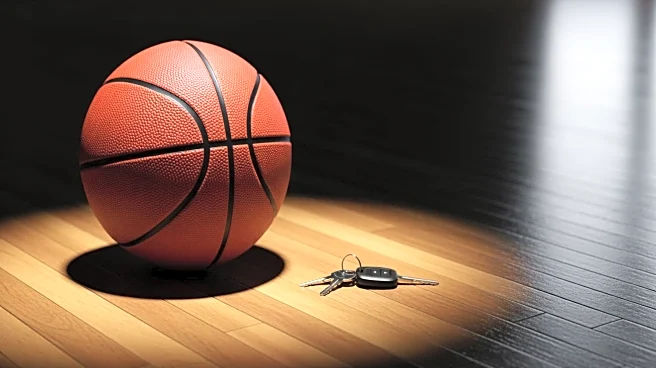What's Happening?
Kennard Davis Jr., a starter on the seventh-ranked BYU men's basketball team, was arrested in Provo, Utah, on suspicion of driving under the influence after crashing his vehicle. According to ESPN, Davis sustained minor injuries from the crash and was subsequently
charged at the police station. The incident raises concerns due to BYU's strict honor code, which mandates students to abstain from alcohol and other substances. Davis, who transferred from Southern Illinois, is noted for his exceptional three-point shooting skills, currently hitting 50% of his attempts. His performance this season includes scoring 12 and six points in two games, although he missed a recent game against Delaware due to a leg injury.
Why It's Important?
The arrest of Kennard Davis Jr. could have significant implications for his academic and athletic career at BYU, given the university's stringent honor code policies. Violations of this code can lead to expulsion, which would not only affect Davis's education but also his position on the basketball team. As a key player, his absence could impact the team's performance, especially with upcoming games against top-ranked opponents like UConn. The situation also highlights the challenges athletes face in balancing personal conduct with institutional expectations, potentially influencing future recruitment and team dynamics.
What's Next?
BYU has stated that they are investigating the situation, which could lead to disciplinary actions against Davis. The outcome of this investigation will determine whether Davis can continue his studies and participation in the basketball program. The team is preparing for a significant match against No. 3 UConn, and Davis's availability could be crucial. Stakeholders, including the university administration, athletic department, and fans, will be closely monitoring developments, which could influence BYU's approach to handling similar incidents in the future.
Beyond the Headlines
This incident underscores the broader issue of athlete conduct and institutional policies in collegiate sports. It raises questions about the support systems in place for student-athletes to manage stress and adhere to behavioral expectations. The case may prompt discussions on the effectiveness of honor codes and the balance between maintaining discipline and providing guidance to young athletes.

















